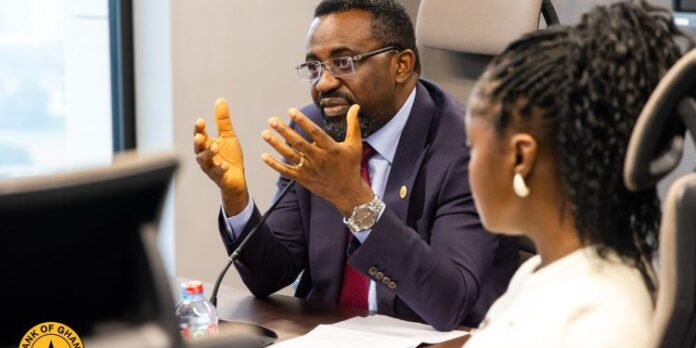The Governor of the Bank of Ghana (BoG), Dr. Johnson Asiama, has reaffirmed the Central Bank’s commitment to transitioning Ghana’s financial system from a phase of stability to one driven by innovation, inclusion, and digital transformation.
Delivering the keynote address at the 42nd Annual General Meeting of the Ghana Association of Bankers and the launch of the GH Bankers’ Voice magazine, Dr. Asiama said the banking sector’s resilience, built over the past decade, now provides a firm platform for innovation-led growth.
Also Read: Mahama swears in 37 new Justices of the High Court
“The true measure of central banking success is not only how we maintain stability, but how we transform that stability into a platform for innovation, inclusion, and growth,” he stated.
According to Dr. Asiama, the sector remains strong, with the capital adequacy ratio at 18.28%, non-performing loans down to 20.77%, and deposits growing by over 17% year-on-year. Profitability has also improved, with return on equity rising to 32.21% and return on assets at 5.64% as of August 2025.
He highlighted that the cedi has appreciated by 37% year-to-date, inflation has eased to 9.4%, and gross reserves now stand at US$10.7 billion, covering more than four months of imports – indicators of restored macroeconomic stability.
Dr. Asiama, however, stressed that stability is not an end in itself but a launchpad for innovation. He outlined BoG’s four-pillar strategy for driving responsible financial sector innovation:
-
Infrastructure Innovation – strengthening digital payment systems through GhIPSS and advancing the eCedi pilot to connect banks, fintechs, and telcos.
-
Regulatory Innovation – modernising supervision via the regulatory sandbox, digital lending guidelines, and the open banking framework currently in proof-of-concept phase.
-
Market Development and Financial Deepening – enhancing access to credit through partnerships with the Development Bank Ghana, World Bank, and Afreximbank, while integrating Ghana into the Pan-African Payment and Settlement System (PAPSS).
-
Risk and Trust Innovation – improving cyber resilience through AI-driven supervisory tools and a Cyber Threat Intelligence Platform for banks and fintechs.
He further disclosed that Ghana is on track to become one of the first African countries to regulate digital-asset activity, with a cryptocurrency bill finalised for submission to Cabinet by December 2025.
Dr. Asiama, speaking further, also urged banks to focus on digital integration, data intelligence, sustainable finance, and customer-centric design, noting that the next decade will favour “the boldest learners, which are those who adapt fastest, collaborate deepest, and innovate safest.”
He concluded by calling on the banking community to sustain the partnership with the Central Bank in building a system that is “stable and transformative, and where prudence and innovation walk hand in hand.”
Norvan Reports


